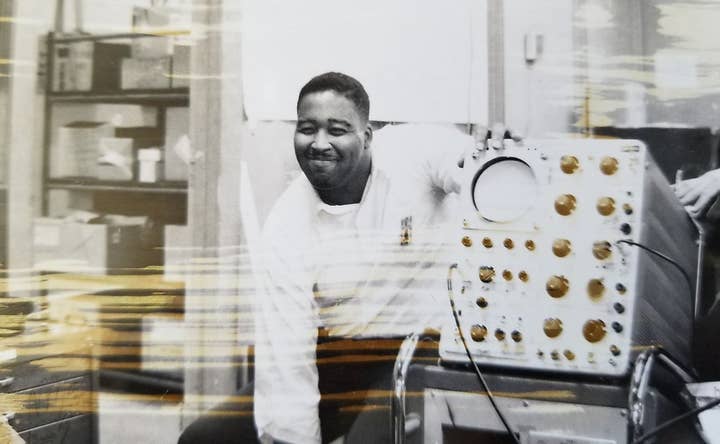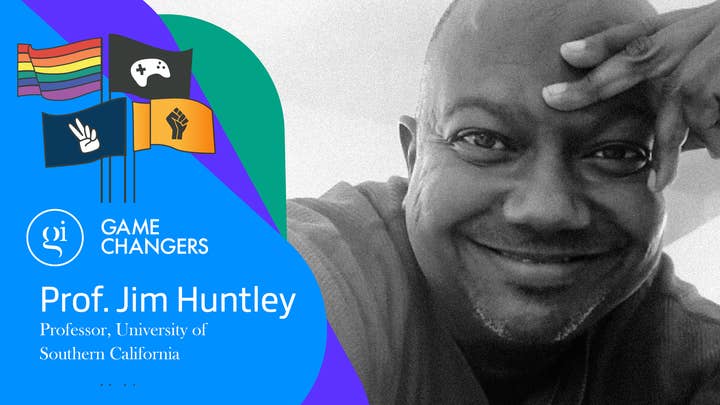Game Changers | Professor Jim Huntley
The USC Games educator and creator of the Gerald A. Lawson Endowment Fund says the games industry needs to put its money where its mouth is on DEI efforts
GamesIndustry.biz Game Changers is a series of profiles on the groups and individuals going the extra mile to make the games industry a better place. These interviews encompass folks from around the world helping to improve conditions and attitudes towards diversity, equity, inclusion, accessibility, mental health and more. You can read more Game Changers interviews here.
Sign up for the GI Daily here to get the biggest news straight to your inbox
While the games industry has made progress on diversity and inclusion, it has been slow and hard fought. Breaking into the field remains challenging for people from overlooked communities.
This drove Professor Jim Huntley, USC Games, and Take-Two to launch the Gerald A. Lawson Endowment Fund in 2021.
Named after the Black engineer that designed the pioneering Fairchild Channel F console, the fund strives to increase Black and Indigenous representation in the games industry.
Speaking with GamesIndustry.biz, Huntley explains that the idea of the fund was sparked by the protests following the murder of George Floyd in the summer of 2020.
"It was seeing how diverse those protests and crowds were," he explains.
"Normally, when a tragedy involves an African American person at the hands of a law enforcement officer, it's primarily an African American neighborhood protesting."
Huntley adds, "[The protests] were everywhere. You would go home and go online and see people in South Korea and Japan. Whoa, this is a moment, and it emotionally affected me.
"[Then I thought] what can I do, to put more energy into making some change in my corner of the world, which is interactive gaming entertainment?"
"What can I do to put more energy into making some change in my corner of the world?"
Huntley says that the first step to creating the fund involved speaking with his department chair and former THQ exec Danny Bilson. They then spoke with USC stakeholders in setting up the endowment, which he adds is usually an administrative process. The pair then started reaching out to their respective game industry contacts, networks of people built up over years at USC and with publishers like THQ and EA.
Huntley notes that there aren't many collegiate game scholarships that focus specifically on Black and Indigenous students.
The professor says the fund's primary goal is to have more Black and Indigenous people within the games industry, more individuals in entry-level positions and not just in leadership positions.
While looking into the data, he noticed that there was room for improvement across the board, but Black and Indigenous representation was particularly poor.
"When we started researching [the] space, other underrepresented groups had challenges getting more [of a] foothold in the industry. But they weren't nearly as stagnant as [Black and Indigenous] communities," he said.
He says that there was hardly any employment data for Indigenous people within the games industry.
"We want to focus our efforts on those two groups, to move the needle"
As for Black developers, a Washington Post article noted that while the percentage of Black game developers has doubled in the last 16 years, it's still just 4% of all development staff.
Huntley expounds, "We want to focus our efforts on those two groups, to move the needle."
He also points to his own professional experiences, in and out of the games industry, as another motivating factor for launching the endowment.
"I would joke just as an aside; I was the only Black person in that room; the more senior I became and promoted, the more frequently that would happen," Huntley says.
"In the games industry, that would happen in the C-suite, in meeting rooms and boardrooms, and even when I worked in the studio on-site at studios. So there are not a lot of African Americans in roles here at all, much less than the senior roles, and that was a cause for concern."
Huntley's last job on the frontlines of a gaming company was at THQ, where he worked from 2008 to 2012 and held the title of VP of global brand management. He believed that the games industry would have made more progress on the DEI front in the time since his departure.
"I was hoping over time that it would slowly start to [improve] itself, and it didn't seem to be happening. I also had Black students who graduated and would say the same thing I said when they entered the industry."
During his time as an executive, opportunities to work on DEI efforts would present themselves. However, they would come with little to no benefits for the individual.
"You get this initiative but don't get a bonus or any benefit to take it on. It will also take ten or 20 hours out of your week. Well, I don't want to do that," he explains.

Huntley notes that with the Gerald A Lawson Fund, he's better positioned to help increase diversity.
He continues, "In my book, [I'm now] trying to educate and inspire a brand-new generation of game developers. But I'm also dealing with the chronic issue that's been happening with the industry, which is how do we get people from [Black and Indigenous] groups to those jobs."
With a clear goal in mind, Huntley and his cohorts spoke with many gaming firms. Take-Two, Microsoft, and Sony were the first to join the initiative. The companies acknowledged the need for more representation for the two communities is a problem.
"I was the only Black person in that room; the more senior I became and promoted, the more frequently that would happen"
Huntley adds that tackling the issue of diversifying the industry requires monetary action.
"If [companies] are not donating or investing funds in a meaningful way, they're not addressing the problem," he says.
As if to lead by example, Huntley notes that USC Games revealed its first Gerald A. Lawson Fund recipients on February 1, the first day of Black History Month.
He adds, "I'm pretty sure [this endowment] will outlast my lifetime. So there will be money that goes towards Black and Indigenous students going into this program forever."
Huntley explains that the importance of the endowment is that it allows for ongoing revenue. It's not contingent upon a company's financial performance, so it wouldn't be in danger during an economic downturn. A student wouldn't be in a position where they would lose the scholarship.
"As the endowment gets bigger, the snowball gets bigger, and it gives more money from an interest perspective," he explains.
Looking at what's next for the Gerald A. Lawson Fund, Huntley is focused on obtaining one more major company partner.
And if anyone in the industry wants to help the endowment, they simply need to contact him.
"I think that the first step is having the commitment and the willingness to invest behind the need," he said.
"To see companies get their checkbooks out speaks much more to me; this shows their values from a cultural perspective than just the [firms] that provide social media lip service."
If you would like to donate to the Gerald A. Lawson Endowment Fund or get in contact with professor Jim Huntley, please visit here.
Sign up for the GI Daily here to get the biggest news straight to your inbox









